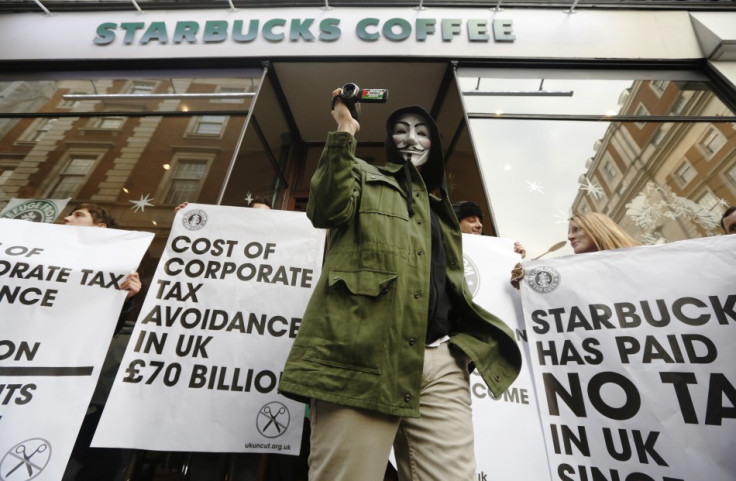How-To-Guide: UK Corporation Tax Avoidance

The world's largest companies use a variety of tax havens, loopholes and schemes to legally avoid paying billions in UK corporation tax.
According to charity Action Aid's Tax Haven Tracker, 98% of the UK's biggest businesses are using tax havens, in order to minimise how much they pay to the government.
But how do companies, which make billions of pounds in profit each year, get away with paying so little?
Here at IBTimes UK, we guide you through the top three UK corporation tax avoidance methods.
Investment and Infrastructure Deduction
Under UK tax law, corporations can claim tax allowances on certain purchases or investments made on business assets.
While a company cannot directly deduct expenditure on those assets when calculating profits or losses, instead it can deduct a capital allowance. Certain types of plant and machinery are included in this clause.
For example, if you are a farmer, you can claim back a new tractor and/or a processor. On a grander scale, if you are a huge multi-national energy company, such as npower, you are able to strike off the amount it cost to build new power plants and operating costs.
This month, RWE npower chief executive Paul Massara told the Energy and Climate Change Select Committee that the company did not pay UK corporation tax between 2009 and 2011 because of the "very simple reason that [we] invested hundreds of millions of pounds in building power plants, creating jobs, creating employment and help[ed] to keep the lights on."
He maintained that "this is in no way tax avoidance, and all of our business is taxable in the UK" because the "simple accounting UK rule" meant that investment could be used to reduce the group's tax liability.
Learn to Love Luxembourg
If you are a corporation and want to legally reduce your tax payments to the UK government, brush up on your German and French, then relocate sales and payments to Luxembourg.
Luxembourg is one of the world's most famous tax havens and by moving sales operations over there, companies are only obliged to pay a tiny UK tax bill, if any at all.
As demonstrated by Amazon and Ebay, the relocation pays dividends, and ensures the company hangs onto as much profit as possible.
In 2005 Amazon rented a five-storey building in Luxembourg's Grund quarter and one year later it transferred ownership of the main Amazon.co.uk business to a Luxembourg company.
Since then it has formed a tax shield for the group, as the UK business is now owned by Amazon EU Sarl and the UK operation is classed only as an "order fulfilment" business.
As Britain's biggest online retailer, Amazon.co.uk generated sales of more than £3.3bn in 2011 but paid zero UK corporation tax from that income, as the UK business is now classified as simply a delivery unit, while all payments for goods go directly to Luxembourg.
Luxembourg charges a 21% rate on business profits while the UK rate stands at 24%.
However, following the UK Chancellor's Budget Statement, Britain could become more competitive than Luxembourg in the tax stakes, as George Osborne revealed he wants to cut the UK corporation tax rate to 20% by 2015.
Prove You're Not Making a Profit
If you're not making a profit then, technically, there is nothing to tax.
Starbucks, one of the world's most high-profile companies, claims it has only made meagre amounts of profit over the last few years. Consequently, despite making £3bn sales, the US coffee chain paid only £8.6m in UK corporation tax over 13 years.
After negotiations with HMRC and a public outcry, including calls for a boycott, Starbucks agreed to pay £20m in corporation tax over two years.
Tui Travel didn't pay any UK corporation tax in the last financial year, claiming that "no profits were chargeable... as they are all eliminated due to losses brought forward from prior years as a results of restructuring and costs incurred due to the ash cloud in 2010."
British American Tobacco also said that any profit was cancelled out by high operating costs, and therefore they didn't have to pay UK corporation tax.
Sugar and sweeteners maker Tate & Lyle said UK corporation tax didn't apply to them because "we made losses in the UK and the tax we pay reflects that."
Read:
UK Parliament Accuses HMRC of 'Unhealthily Cosy' Relationship with Tax Avoidance Accountants
UK Tax Avoidance: Top 10 Giant Companies Dodging Corporation Tax [SLIDESHOW]
UK Tax Avoidance: HMRC Spots £1bn in Potential Unpaid Big Business Tax
Starbucks, Google and Amazon to Face Legislators' Probe Over Tax Avoidance
© Copyright IBTimes 2025. All rights reserved.






















